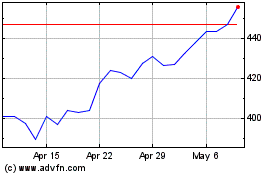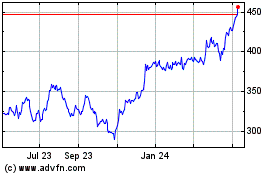Goldman Pursues Majority Stake in Its China Venture -- Update
August 21 2019 - 9:19AM
Dow Jones News
By Chao Deng
BEIJING -- Goldman Sachs Group Inc. has applied with Chinese
regulators to take a majority stake in an investment-banking joint
venture, the most recent move by a foreign company to tap the
nation's vast financial sector.
The company filed paperwork to increase its stake to 51% from
33% in Goldman Sachs Gao Hua Securities Co., with the goal of
eventually taking over the local operation completely, according to
a Goldman spokesman.
The move means three of Wall Street's biggest names could soon
control their brokerages in China. Morgan Stanley is awaiting
approval for a deal that will give it majority control of its
onshore securities arm, while JPMorgan Chase & Co received the
green light to set up a majority-owned brokerage joint venture.
Still, it could be a risky proposition amid an escalating trade
conflict between China and the U.S., according to industry experts
and analysts.
Beijing has threatened to retaliate against the Trump
administration's plan to place tariffs on an additional $300
billion in Chinese products. Analysts say that could involve
targeting individual U.S. companies, as has been the case with
FedEx Corp. The delivery company has been under investigation by
Chinese authorities over packages destined for a Chinese
telecommunications firm.
Goldman, which waited for more than a year to apply in part to
sort out regulatory hindrances, declined to comment on the trade
dispute.
Beijing officials have said they are opening up the country's
financial sector despite the trade war. Authorities have given
permission to a handful of foreign firms to own majority stakes in
mainland banking, securities and insurance companies. Before 2017,
Western financial companies could operate in China only as a
minority partner in a securities joint venture with a local
company.
Expanding in China has come slower than many foreign companies
hoped, in large part due to regulatory restrictions. JPMorgan
Chase, Nomura Holdings Inc. and UBS Group AG are among the
companies that have been allowed to own majority stakes in their
Chinese ventures. Approvals for Goldman and Morgan Stanley could
take months.
Some approvals for foreign financial companies came at key
moments in U.S.-China trade negotiations, as Beijing aimed to show
goodwill toward the U.S., according to analysts.
Goldman had waited to apply, in part to figure out a way to meet
the Chinese securities regulator's requirement that majority owners
have at least 100 billion yuan ($14.2 billion) in net assets in the
entity the apply with.
Goldman spokesman Edward Naylor declined to disclose details on
how the firm met the requirement, including which entity the firm
applied with. Industry executives and analysts had lodged
complaints that the threshold is unnecessarily high, meaning only a
handful of foreign securities firms operating in the China market
could meet it using their regional entities.
In recent months, China sped up its timeline for opening up the
financial sector. It said it would let foreigners freely invest in
futures dealers, brokerages and life insurers in 2020, one year
ahead of Beijing's previous schedule.
The accelerated timeline comes in part as Beijing wants to
attract more foreign investment amid downward pressure on the
economy.
Goldman's plan is to move its local partner's assets into the
joint venture, in order to consolidate its mainland holdings. The
restructuring will require various regulatory approvals.
Mr. Naylor said Chinese businessman Fang Fenglei and Legend
Holdings, the two largest Chinese shareholders of Gao Hua
Securities are expected to decrease their stakes. "The endgame for
us has always been 100% [ownership]," he said.
Write to Chao Deng at Chao.Deng@wsj.com
(END) Dow Jones Newswires
August 21, 2019 09:04 ET (13:04 GMT)
Copyright (c) 2019 Dow Jones & Company, Inc.
Goldman Sachs (NYSE:GS)
Historical Stock Chart
From Aug 2024 to Sep 2024

Goldman Sachs (NYSE:GS)
Historical Stock Chart
From Sep 2023 to Sep 2024
